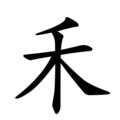禾
Hello, you have come here looking for the meaning of the word 禾. In DICTIOUS you will not only get to know all the dictionary meanings for the word 禾, but we will also tell you about its etymology, its characteristics and you will know how to say 禾 in singular and plural. Everything you need to know about the word 禾 you have here. The definition of the word 禾 will help you to be more precise and correct when speaking or writing your texts. Knowing the definition of禾, as well as those of other words, enriches your vocabulary and provides you with more and better linguistic resources.
| ||||||||
 | ||||||||
| ||||||||
Translingual
| Stroke order (Japan) | |||
|---|---|---|---|
| Stroke order | |||
|---|---|---|---|

| |||
Han character
禾 (Kangxi radical 115, 禾+0, 5 strokes, cangjie input 竹木 (HD), four-corner 20904, composition ⿱丿木 or ⿻千𠆢)
- Kangxi radical #115, ⽲.
Derived characters
Additional Derived Characters
Related characters
References
- Kangxi Dictionary: page 848, character 18
- Dai Kanwa Jiten: character 24906
- Dae Jaweon: page 1270, character 11
- Hanyu Da Zidian (first edition): volume 4, page 2588, character 1
- Unihan data for U+79BE
Chinese
Glyph origin
| Historical forms of the character 禾 | |||
|---|---|---|---|
| Shang | Western Zhou | Shuowen Jiezi (compiled in Han) | Liushutong (compiled in Ming) |
| Oracle bone script | Bronze inscriptions | Small seal script | Transcribed ancient scripts |

|

|

|

|
Pictogram (象形) – picture of a plant stalk. The stalk is more recognizable in older form. Similar to 來 but unrelated to 釆.
Etymology 1
| simp. and trad. |
禾 | |
|---|---|---|
Cognate with Tibetan གྲོ (gro, “wheat”) (Hill, 2019).
Pronunciation
- Mandarin
- Cantonese
- Gan (Wiktionary): uo4
- Hakka
- Jin (Wiktionary): hue3
- Northern Min (KCR): ô
- Eastern Min (BUC): huò
- Puxian Min (Pouseng Ping'ing): hor2
- Southern Min
- Wu (Shanghai, Wugniu): 6wu
- Xiang (Changsha, Wiktionary): o2
- Mandarin
- (Standard Chinese)+
- Hanyu Pinyin: hé
- Zhuyin: ㄏㄜˊ
- Tongyong Pinyin: hé
- Wade–Giles: ho2
- Yale: hé
- Gwoyeu Romatzyh: her
- Palladius: хэ (xɛ)
- Sinological IPA (key): /xɤ³⁵/
- (Standard Chinese)+
- Cantonese
- (Standard Cantonese, Guangzhou–Hong Kong)
- Jyutping: wo4
- Yale: wòh
- Cantonese Pinyin: wo4
- Guangdong Romanization: wo4
- Sinological IPA (key): /wɔː²¹/
- (Taishanese, Taicheng)
- Wiktionary: vo3
- Sinological IPA (key): /vᵘɔ²²/
- (Standard Cantonese, Guangzhou–Hong Kong)
- Gan
- (Nanchang)
- Wiktionary: uo4
- Sinological IPA (key): /uo³⁵/
- (Nanchang)
- Hakka
- (Sixian, incl. Miaoli and Neipu)
- Pha̍k-fa-sṳ: vô
- Hakka Romanization System: voˊ
- Hagfa Pinyim: vo1
- Sinological IPA: /vo²⁴/
- (Hailu, incl. Zhudong)
- Hakka Romanization System: vo
- Sinological IPA: /vo⁵⁵/
- (Meixian)
- (Sixian, incl. Miaoli and Neipu)
- Jin
- (Taiyuan)+
- Wiktionary: hue3
- Sinological IPA (old-style): /xuɤ⁴⁵/
- (Taiyuan)+
- Northern Min
- (Jian'ou)
- Kienning Colloquial Romanized: ô
- Sinological IPA (key): /o³³/
- (Jian'ou)
- Eastern Min
- (Fuzhou)
- Bàng-uâ-cê: huò
- Sinological IPA (key): /huo⁵³/
- (Fuzhou)
- Puxian Min
- (Putian)
- Pouseng Ping'ing: hor2
- Báⁿ-uā-ci̍: hó̤
- Sinological IPA (key): /hɒ¹³/
- (Xianyou)
- Pouseng Ping'ing: hor2
- Sinological IPA (key): /hɒ²⁴/
- (Putian)
- Southern Min
- Wu
- Xiang
- (Changsha)
- Wiktionary: o2
- Sinological IPA (key): /o¹³/
- (Changsha)
- Middle Chinese: hwa
- Old Chinese
- (Baxter–Sagart): /*ˤoj/
- (Zhengzhang): /*ɡoːl/
Definitions
禾
Synonyms
Dialectal synonyms of 稻子 (“rice (plant)”)
Compounds
References
- “禾”, in 漢語多功能字庫 (Multi-function Chinese Character Database), 香港中文大學 (the Chinese University of Hong Kong), 2014–
Etymology 2
| simp. and trad. |
禾 | |
|---|---|---|
Pronunciation borrowed from Mandarin 我 (wǒ), tone from Cantonese 我 (ngo5).
Pronunciation
- Cantonese
- (Standard Cantonese, Guangzhou–Hong Kong)
- Jyutping: wo5
- Yale: wóh
- Cantonese Pinyin: wo5
- Guangdong Romanization: wo5
- Sinological IPA (key): /wɔː¹³/
- (Standard Cantonese, Guangzhou–Hong Kong)
Definitions
禾
Etymology 3
| simp. and trad. |
禾 | |
|---|---|---|
(This etymology is missing or incomplete. Please add to it, or discuss it at the Etymology scriptorium.)
Pronunciation
- Southern Min (Teochew, Peng'im): da5
- Southern Min
- (Teochew)
- Peng'im: da5
- Pe̍h-ōe-jī-like: tâ
- Sinological IPA (key): /ta⁵⁵/
- (Teochew)
Definitions
禾
- (Teochew, Leizhou Min) grain; cereal; crop
Japanese
Kanji
禾
Readings
- Go-on: わ (wa)
- Kan-on: か (ka)←くわ (kwa, historical)
- Kun: いね (ine, 禾)、のぎ (nogi, 禾)
- Nanori: のぎ (nogi)、のぶ (nobu)、ひいず (hīzu)
Korean
Etymology 1
Hanja
Etymology 2
Hanja
禾 (eumhun 말 이빨의 수효 수 (mal ipparui suhyo su))
Vietnamese
Han character
- This term needs a translation to English. Please help out and add a translation, then remove the text
{{rfdef}}.
